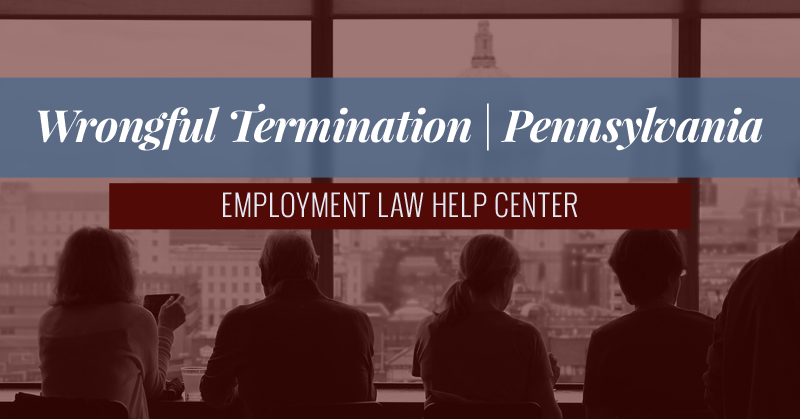Pennsylvania Wrongful Termination
Each state has different laws regulating the relationship between employers and employees, but most states, including Pennsylvania, have laws in place that prohibit wrongful termination, or the unlawful discharge of an employee for reasons that violate company policy or the employee’s rights. For example, it is a violation of PA employment law for an employer to fire an employee because of his or her race, age or religion, or retaliate against an employee for asserting his or her rights, i.e. filing a discrimination complaint with human resources. If you believe you have been the victim of wrongful termination in Pennsylvania, contact a knowledgeable employment law attorney as soon as possible to discuss your legal rights. You may have grounds to file a wrongful termination claim against your employer, in order to pursue financial compensation for lost wages, pain and suffering, and other related damages.

Discriminatory Firing in Pennsylvania
In Pennsylvania, as in many other states, employees work at will, which means they can be fired at any time and for any reason, or for no reason at all. However, under Pennsylvania law, if an employer fires an employee for discriminatory reasons, in retaliation for exercising his or her employee rights, or in violation of an employment contract, the employee may have a legal claim against the employer for wrongful termination. Furthermore, if the employee has a written employment contract promising job security, or an implied contract based on clear oral promises or statements in an employee handbook, the employee is not considered at will. While the following sections highlight topics related to PA wrongful termination laws, it is important to check back often, as state employment rights can change, as courts issue new rulings and legislators pass or amend laws in Pennsylvania.
Examples of Protected Characteristics
Federal law prohibits the firing of an employee based on a protected characteristic, such as race, color, sex, religion or citizenship status, but only employers with a minimum number of employees are required to comply with these laws. For example, most types of workplace discrimination are prohibited once an employer has at least 15 employees, but the minimum is four employees for citizenship status discrimination and 20 employees for age discrimination. In Pennsylvania, it is against the law for employers with at least four employees to discharge an employee based on the following protected characteristics:
- Color
- Race
- Sex
- National origin
- Pregnancy
- Ancestry
- Age (for employees between the ages of 40 and 70)
- Religion
- Disability
- Use of a service animal
- Relationship with a disabled person
- Having a GED rather than a high school diploma

Public Policy Violations in PA
In addition to protected characteristics, there are also laws in Pennsylvania that prohibit an employer from firing an employee if the firing violates public policy principles. For example, an employer in Pennsylvania may not terminate an employee:
- Because the employee refuses to commit a crime
- Because the employee obeyed the law
- If an existing law forbids the firing (i.e., laws against workplace discrimination and harassment)
One clear example of a discharge from employment that violates public policy would be if an employer in Pennsylvania fires an employee for refusing to file a false tax report, which is a crime.
Filing a PA Wrongful Termination Claim
If you have been dismissed from employment in Pennsylvania because of your religion, color, race, or another protected characteristic, you may have grounds to file a wrongful termination claim against your employer. However, Pennsylvania employment law requires that you first file a complaint with the Pennsylvania Human Relations Commission, which enforces that state’s laws prohibiting discrimination in the workplace. Furthermore, if you have a written or implied employment contract, and your employer fires you without good cause, you may have grounds to file a breach of contract claim. Contact a knowledgeable employment law attorney in Pennsylvania today, to ensure that your rights as an employee are protected, and to discuss your options for legal recourse.




